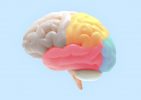Normal Brain Aging vs. Alzheimer’s and Dementia
People are often confused about the difference between normal brain aging and dementia-related conditions like Alzheimer’s disease. Some are even under the erroneous belief that dementia is an unavoidable part of aging. While it is true that a minor decline in certain mental abilities can be expected as we get older, there is a large number of people who live well into their later years while remaining fully functional from a psychological perspective.
Normal Aging in the Brain
All parts of the human body are subject to the effects of time. There is simply no way to avoid it, though the makers of numerous beauty and supplement products would likely disagree. The brain goes through several physical changes as we reach an advanced age (around 60+):
- Some brain areas shrink
- Connections between neurons weaken
- Inflammation is more likely to occur
- Veins and other parts of the vascular system deteriorate
- Hormone levels change
As may be expected, these biological developments are accompanied by some alterations in mental processes, such as:
- Loss of older memories (especially the details)
- Less retention time for new information
- Trouble finding the right words from time to time
- Occasionally forgetting names
- Reduced ability to multitask
- Slower overall mental processing
It is very difficult to predict how aging will impact mental functions on a person to person basis. Individuals exhibit a unique mix of symptoms due to brain aging, and it is likely that certain effects will be more prominent than others. Some people may display little to no ill effects at all.
Aging With Alzheimer’s and Other Dementias
Unfortunately, a significant portion of the population will be stricken with an age-related disorder like Alzheimer’s or another form of dementia (about 10%). There are no physical brain changes shared between all types of these disorders, though specific conditions may be identified by the presence of biological features that are not a part of normal aging:
- Alzheimer’s disease is associated with the abnormal accumulation of proteins in the brain, resulting in the formation of plaques and tangles.
- Lewy body dementia is also linked to abnormal protein accumulation in the brain, but of a different variety than Alzheimer’s disease.
- Vascular dementia is a result of damage to the brain’s vascular system (blood-carrying structures, such as veins) due to a medical condition (like a stroke) or traumatic injury.
- Frontotemporal dementias are a group of afflictions that are identified by a significant reduction in the amount of matter in the frontal and temporal lobes of the brain.
There are no physical symptoms shared among all dementia-related disorders. However, there are a number of behavioral changes that may serve as common signs of abnormal cognitive decline:
- Becoming lost in familiar areas
- Quickly forgetting recent events
- Loss of language comprehension skills
- Mood swings
- Drastic changes in personality
- Asking repetitive questions
- Balance impairment
- Changes to diet and sleep habits
Symptom Detection
The early identification of psychological and behavioral changes like those listed above is important to ensure the best possible outcomes. People with developing dementia are commonly unaware that they are displaying any of these symptoms, so the responsibility of early detection is often placed on the people who interact with them the most. However, as we have discussed, it can be difficult to tell the difference between normal and impaired brain aging.
Thankfully, there are support options for people who are worried about abnormal brain aging in themselves or others. The BrainTest® app is an early-detection tool that can help identify the psychological and behavioral warning signs of Alzheimer’s and other dementia-related disorders. It is a simple, self-administered test that can be used by seniors to ensure their own well-being, either of their own volition or at the request of a concerned loved one. Early detection should be immediately followed by professional testing, which is necessary to confirm the presence and extent of even minor impairments at the biological level.

